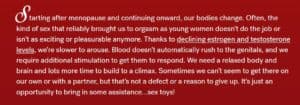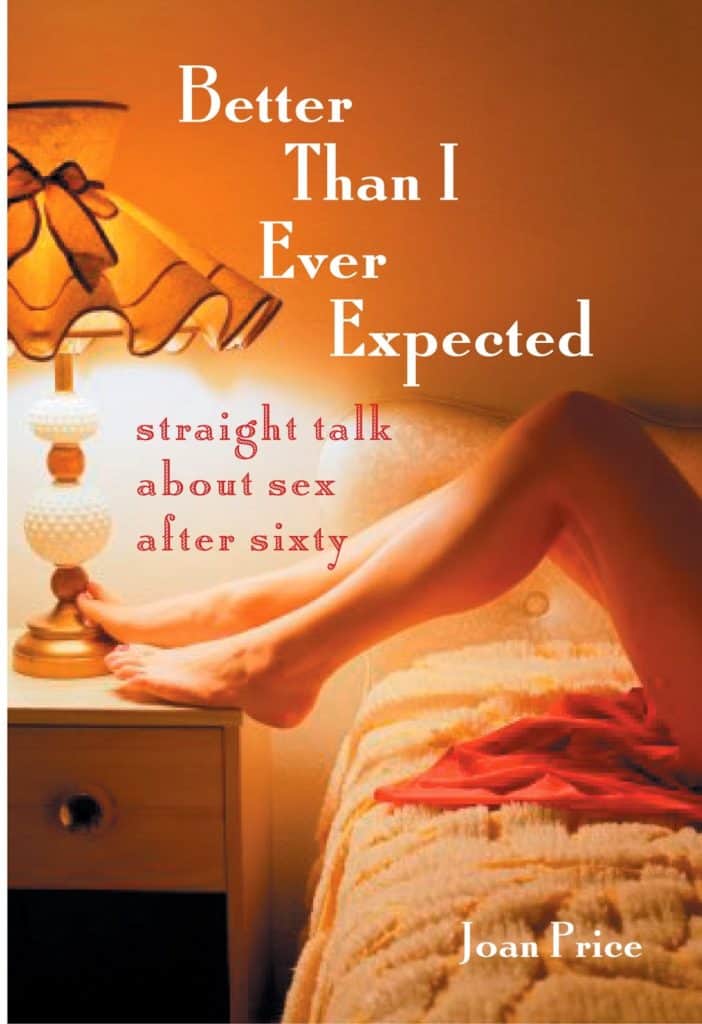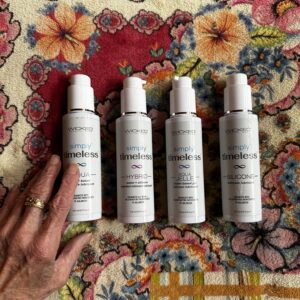Posts Tagged ‘media’
“Sex After 60” in Cosmopolitan, including sex toys!
How age-affirming that Cosmopolitan magazine — usually aimed at a readership of young women — devoted a special digital issue on “Sex After 60“! No less than 11 articles, from celebrity quotes to true “sexcapades” to — you knew this was coming — an article on sex toys, written by me!

from “10 Sex Toys to Fit Your Every Need” by Joan Price for Cosmopolitan
In “10 Sex Toys to Fit Your Every Need,” I discuss why senior women, especially, benefit from the added oomph and intensity of vibrational assists. Since this article will be read by folks who may not have experienced sex toys and/or consider them shameful, icky, or an indication that their bodies or partners are defective, I assure readers,
And don’t think that because a sex toy isn’t “natural,” you shouldn’t need it. We take pills for headaches, wear reading glasses, and cook on stoves instead of building fires. Give sex toys a chance. You deserve sexual pleasure at this time of life! You can even invite your partner to enjoy them with you. (If they’re reluctant, try, “My body responds differently now; I need extra sensation to reach orgasm reliably. Just as we need lube, I need this. I’ll show you how it can work for you too.”)
The main thrust of the article is a list of 10 toys that I recommend particularly for senior vulva owners, from those who need a gentle assist to those who require or prefer major power. You can read my quickie blurbs about each one, and for lots more information, read my full reviews on this blog by clicking on the name of each sex toy below. Enjoy!
to those who require or prefer major power. You can read my quickie blurbs about each one, and for lots more information, read my full reviews on this blog by clicking on the name of each sex toy below. Enjoy!
- Eroscillator. My go-to favorite vibrator for decades for clitoral stimulation during solo or partnered sex.
- Inya Rose: This lovely stimulator feels like a skilled partner is sucking gently (or strongly) on your clitoris.
- Hot Octopuss Kurve: The most festive fun you can give your vagina with two motors throbbing and thrumming independently.
- Tenga Iroha Yuki: If you only need a mild assist, and you want a vibrator that doesn’t look like a vibrator, this one is adorable and good for beginners to sex toys.
- Fun Factory Volta: The most versatile, all-gender vibrator, with unlimited uses for your erogenous zones and your partner’s.
- We-Vibe Touch X: This palm-sized clitoral vibrator is terrific for travel and mighty strong considering the size.
- Womanizer Premium Eco: the best of the Pleasure Air Technology vibrators, in my view, and its recyclable parts are good for the planet.
- We-Vibe Melt: This streamlined version of the Womanizer’s Pleasure Air Technology is slender enough for partnered as well as solo sex, yet still strong.
- Magic Wand Rechargeable: It wouldn’t be a “best sex toys” list without the king of vibrators, would it? If you prefer a lighter, somewhat smaller version than the hefty original, try the Mini.
- Fun Factory Limba Flex Dildo: Older vaginas are often more comfortable with penetrative toys like these that are slender, smooth, bendable, and bodysafe.
And of course, at our age, we need to use a great lubricant with all sexual touch including vibrators. These recommended sex toys are silicone, so choose a water-based or hybrid lube, such as the new simply® timeless line from Wicked Sensual Care, with ingredients so healthy and effective that you can use simply® timeless as a vaginal moisturizer as well as a sexual lubricant.
The “Ick Factor”: 2006 vs 2023 Sexuality and Ageism
“It’s important to realize that the Ick Factor doesn’t just hurt seniors who might read Yahoo comments or overhear a joke or criticism. It hurts anyone of any age who believes that sex is just for the young. I’m here from the Land of Old to tell you that if you disparage older-age sexuality and close your mind to aging with zest and spice, this attitude hurts you. We’re not old, expendable excuses for human beings: we’re you in a few decades.”
I’m super proud of “Senior Sex: Yes, Old People Get It On, Too,” which I wrote for Queer Majority. I hope you’ll read and share it. I talk about the Ick Factor, the attitude of much of our society that the idea of older people enjoying sex is ludicrous, disgusting, icky. I’ve been fighting that attitude since I started doing this work in 2005. Every time I think that people have grown to accept older age sexuality — after all, if we’re lucky, we’ll all get old! — I’m blindsided by proof that the Ick Factor is alive and thriving. In this case, it was encountering horrible comments on a lovely, age-positive, sex-positive Yahoo News article. I hope you’ll be as appalled as I was when you read them.
I’d like to tell you about an earlier example of the Ick Factor.

Joan on ABC Nightline
It started splendidly on Dec. 1, 2006, when I was interviewed by ABC Nightline for a segment on senior sex and dating. The segment went beautifully. After it aired, my website traffic tripled; my blog traffic quadrupled. I was exhilarated! Hurray, senior sex is discussed on network TV and people want to know more!
Then on Dec. 5, 2006, two satellite radio shock jocks – I’d rather not give them the publicity of naming them – got wind of the topic and read ABC’s synopsis of the show aloud, punctuating their reading with “eeewwwww” and lewd comments. When they learned that I had a blog about, in their words, “old people having sex,” they were totally disgusted. They tracked down what they called the “old lady sex blog,” reading my blog posts aloud for 11 minutes, making even lewder and viler comments as they read. They made fun of a male reader who wrote me his personal story of trying to have sex with a new woman after divorce, prostate cancer, and Viagra, for example, saying about him, “Emasculated nothing!…”Stinks in bed!…C’mon old puddin’ prostate!”
More samples of their comments:
- “Disgusting whore of a granny!”
- “You want to have a sex life? Check yourself into a home and lie face down as the orderly makes his rounds in the morning.”
- “Wear a condom, I don’t want to get Alzheimer’s!”
- “Break her hip!”
Meanwhile, their fans, who ran a message board about the show, also located my blog and started visiting it and posting comments. I foolishly had not set up a moderation requirement at that time, and people were free to comment at will. I opened my computer that day to find 40+ ageist, racist, sexist, and otherwise just plain vile comments. For example, they wrote what they’d like to do to Granny – in what position and with what force – before pushing her down the stairs. I spent the afternoon finding and deleting the horror show.
What does this kind of behavior indicate about our society? Why is it that ageist stereotypes are just fine, old people are acceptable targets, and all of us past middle age are supposed to retire our sex drive and need for intimacy and just settle into… what? … just being “old”?
Many thanks to Queer Majority for helping me turn this attitude around and fight the Ick Factor in 2023. Will you join us? I invite your comments (moderated, just so you know).
Gen Silent: Watch for free by 1/1/14
Please make time to watch Gen Silent. The producers of this LGBT Aging documentary have made it available free for home streaming through New Years Day 2014.
Gay, Lesbian, Bisexual and Transgender older people who fought the first battles for equality now face so much fear of discrimination, bullying and abuse that many are hiding their lives to survive. Thousands are dying earlier than their straight counterparts because they are isolated and afraid to ask for help. But a growing number of people are fighting to keep
LGBT aging from meaning aging in silence.
“LGBT elders are going back in the closet.”
“In the first nursing home, we weren’t welcomed there as a gay couple.”
“They [caregivers] didn’t want to touch my body.”
“You just know when they don’t want you there. When you feel they don’t want you, you’re in a state of stress.”
“All I can do is sit in shadows, holding his tissue-paper hand, watching him breathe.”
These are comments from LGBT elders speaking out about the prejudice, hostility, and fear they face. No, not just when they were young, but now — in long-term care facilities, from caregivers, and from medical providers.
KrysAnne, a transgender woman, is living alone at the end of her life. “Most people who transition expect losses, but I didn’t expect to lose everyone,” she says. “For two years, I desperately tried to connect with my family. In some cases the letters weren’t even opened.”
One letter that was returned contained the message, “So glad someone finally took off your balls. What do you call yourself now. FREAK or IT??”
Thank you, filmmaker Stu Maddux, for making this stunning documentary and for providing it for free streaming right now. I’m not permitted to embed the video here, so please click here to watch it.
I am permitted to embed the trailer:
After you watch the film, I hope you’ll contribute your comments. (By posting here, you’re giving me permission to use excerpts from your comments in my new book, The Ultimate Guide to Sex after Fifty, without identifying you in any way.)
Open letter to Miley Cyrus about sex after (gasp!) 40
 Really, Miley Cyrus? You think sex ends at 40? You told Matt Lauer that at 55, he was “definitely not sexual”?
Really, Miley Cyrus? You think sex ends at 40? You told Matt Lauer that at 55, he was “definitely not sexual”?
On what planet? Oh, right, the youth planet!
Miley, you could teach me plenty about fame, music, handling bad publicity, and, I suppose, twerking (if I thought that I needed it to feel sexy, which I don’t, and if my 69-year-old back would handle it, which it wouldn’t).
My day job is writing and speaking about senior sex, which you think doesn’t exist. Here are just a few facts about it:
- Sex can be better after 40, 50, and 60 than it ever was in our 20s. Then, we as young women were driven by hormones, anxious about our partners liking us or finding us sexy enough, and not terribly good at communicating what we needed to reach orgasm. Our partners, also hormone-driven, rushed to their own finish, often leaving us behind. Often, our fear of pregnancy outweighed our enjoyment.
- Now, we’re no longer propelled by our hormones — we’re having sex for other reasons: sexual pleasure and release, intimacy, joy, bonding, emotional well-being, and about a gazillion other good reasons. We know how to slow down and enjoy the sensations and the feelings.
- Is sex the same at 50 or 70 as it was when we were your age? No. We do have challenges. We also have the knowledge (or know where to find it, such as in my award-winning book, Naked at Our Age: Talking Out Loud about Senior Sex) to overcome those challenges, and the communications skills to deal with them.
If you’d like to discuss this or battle me in a televised face-off (with Matt Lauer moderating), please have your people contact my people. I’d be delighted.
Please slow down and hear this:
 Miley, I’ll be happy to send you a copy of Better Than I Ever Expected: Straight Talk about Sex After Sixty to further your education (and, I hope, delight you), if you send me your mailing address.
Miley, I’ll be happy to send you a copy of Better Than I Ever Expected: Straight Talk about Sex After Sixty to further your education (and, I hope, delight you), if you send me your mailing address.
You’re welcome.
 Brian Alexander, a top sex and science journalist, interviewed me yesterday about this. Please read his smart and sassy article here. “You’re going to laugh about what Miley Cyrus just said,” he said when he called me. Yes, I laughed, I commented, and it got me so revved up that I had to expand my views here a day later. Thank you, Brian.
Brian Alexander, a top sex and science journalist, interviewed me yesterday about this. Please read his smart and sassy article here. “You’re going to laugh about what Miley Cyrus just said,” he said when he called me. Yes, I laughed, I commented, and it got me so revved up that I had to expand my views here a day later. Thank you, Brian.



